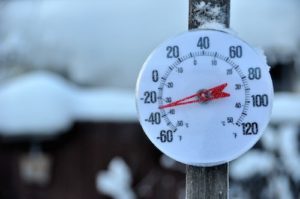Winter can put a damper on more than just your mood – it can also dampen your home (in more ways than one). The seasonal weather can be unpredictable with freezing rain and temperatures to blizzards resulting in high winds and double-digit snow totals. So to help prepare you and your home for the unpredictability of the winter season, here is our winter weather prep sheet that provides some ways to protect your home and keep it secure as you simultaneously cross your fingers and hope for some early spring weather.
Fire protection. With the cold and freezing temperatures, fires become an increased hazard. One of the best ways to prevent a fire is to install a fire alarm system. Sixty-two percent of home fire deaths are the result of homes without fire alarm systems or non-working fire alarms. To prevent a fire, there are a few more things to keep in mind:
- Don’t use the oven as a heating device
- Use electric space heaters with automatic shut-off switches
- Keep a fire extinguisher handy
- Never leave lit candles alone
- Keep anything flammable (e.g., curtains, furniture, papers, etc.) at least three feet away from heating equipment
- Have heating equipment and chimneys inspected and maintained every year
- Have a device for gas detection, like a carbon monoxide detector
Home security. Keeping your home secure is always a concern no matter what time of year and winter is no exception. Installing a home security system can help your home be in constant communication in situations such as power outages. So while setting up booby traps and protecting your home like Kevin in Home Alone may sound like fun, there are a few other ways to secure your home during the winter. They include:
- Keep doors and windows locked, especially when away from the home and at night
- Have plenty of exterior lighting
- Keep a spare key with a trusted neighbor rather than hiding one around your home’s exterior
Emergencies. During the winter months, you want your loved ones to be prepared, be able to quickly contact emergency services, and have whatever they need within reach. One main consideration is creating an emergency plan, which can lessen the chaos and reduce panic in times of emergency. For those family members living on their own, having a personal emergency response system can help keep everyone informed. Here are a few tips for the whole family to be prepared during winter emergencies:
- Keep fresh batteries and battery operated flashlights on-hand
- Keep contact numbers and information easily accessible
- Have non-perishable food items and bottled water in case of a power outage
- Keep extra blankets and sleeping bags handy
- Always have a first aid kit and a supply of essential medicines
- Have back-up heating equipment
- Keep track of inside temperatures (elderly are more susceptible to health problems from the cold)
- Communicate with everyone about an emergency plan (e.g., contacts, routes, meeting spot, etc.)
Water damage. Winter weather and freezing temperatures can wreak havoc on your home, especially when it comes to flooding. Water pipes can freeze and cause them to burst or water heaters can malfunction and leak. With the average cost for repairing water damage is $15,000, you want to make sure you can prevent flooding in your home. Consider these steps:
- Take precautionary measures to prevent pipes from freezing
- Invest in a flood protection system with leak detectors to alert when something goes wrong
- Insulate water lines running along outer walls
Additional Tips. Keeping your loved ones and home safe in the winter season are important, so here are a few extra tips to go the extra mile:
- Bring pets indoors (or provide adequate shelter and access to unfrozen water)
- Install an outdoor thermometer that’s easy to read
- Clear away any lingering branches that could cause damage to your home in the event of a storm
- Use a smart thermostat to keep your home warm, regulate temperatures, and save money
While winter weather is not always predictable, listening to the weather forecast, regularly checking your emergency supplies, and following these tips can help keep your loved ones safe and your home secure. For additional information, check out these resources:

